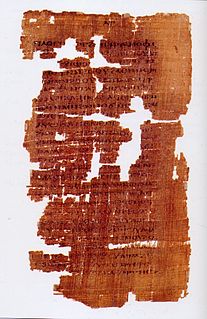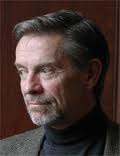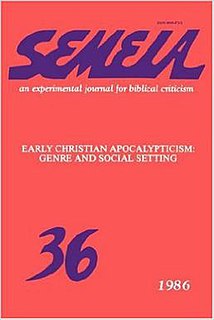
Apocrypha are works, usually written, of unknown authorship or of doubtful origin. Biblical apocrypha is a set of texts included in the Latin Vulgate and Septuagint but not in the Hebrew Bible. While Catholic tradition considers some of these texts to be deuterocanonical, Protestants consider them apocryphal. Thus, Protestant bibles do not include the books within the Old Testament but have often included them in a separate section, usually called the Apocrypha. Other non-canonical apocryphal texts are generally called pseudepigrapha, a term that means "false attribution".
Burton L. Mack is an American author and scholar of early Christian history and the New Testament. He is John Wesley Professor emeritus in early Christianity at the Claremont School of Theology in Claremont, California. Mack is primarily a scholar of Christian origins, approaching it from the angle of social group formation. Mack's approach is skeptical, and he sees traditional Christian documents like the Gospels as myth as opposed to history. He sees the gospels more as charter documents of the early Christian movements, not as reliable accounts of the life of Jesus.

The Jesus Seminar was a group of about 50 critical Biblical scholars and 100 laymen founded in 1985 by Robert Funk that originated under the auspices of the Westar Institute. The seminar was very active through the 1980s and 1990s, and into the early 21st century.

The Gospel of Peter, or Gospel according to Peter, is one of the non-canonical gospels rejected as apocryphal by the Church Fathers and the Catholic Church's synods of Carthage and Rome, which established the New Testament canon. It was the first of the non-canonical gospels to be rediscovered, preserved in the dry sands of Egypt.

The Gospel of Nicodemus, also known as the Acts of Pilate, is an apocryphal gospel claimed to have been derived from an original Hebrew work written by Nicodemus, who appears in the Gospel of John as an associate of Jesus. The title "Gospel of Nicodemus" is medieval in origin. The dates of its accreted sections are uncertain, but according to the 1907 edition of the Catholic Encyclopedia scholars agree in assigning the resulting work to the middle of the fourth century AD.
The historicity of Jesus is the question if Jesus of Nazareth can be regarded as a historical figure. Virtually all New Testament scholars and Near East historians, applying the standard criteria of historical-critical investigation, find that the historicity of Jesus is effectively certain, although they differ about the beliefs and teachings of Jesus as well as the accuracy of the details of his life that have been described in the gospels.

The Gospel of the Hebrews, or Gospel according to the Hebrews, was a syncretic Jewish–Christian gospel. The text of the gospel is lost with only fragments of it surviving as brief quotations by the early Church Fathers and in apocryphal writings. The fragments contain traditions of Jesus' pre-existence, incarnation, baptism, and probable temptation, along with some of his sayings. Distinctive features include a Christology characterized by the belief that the Holy Spirit is Jesus' Divine Mother and a first resurrection appearance to James, the brother of Jesus, showing a high regard for James as the leader of the Jewish Christian church in Jerusalem. It was probably composed in Greek in the first decades of the 2nd century, and is believed to have been used by Greek-speaking Jewish Christians in Egypt during that century.
Elaine Pagels, née Hiesey, is an American religious historian who writes on the Gnostic Gospels. She is the Harrington Spear Paine Professor of Religion at Princeton University.

The New Testament apocrypha are a number of writings by early Christians that give accounts of Jesus and his teachings, the nature of God, or the teachings of his apostles and of their lives. Some of these writings have been cited as scripture by early Christians, but since the fifth century a widespread consensus has emerged limiting the New Testament to the 27 books of the modern canon. Roman Catholic, Eastern Orthodox and Protestant churches generally do not view these New Testament apocrypha as part of the Bible.

The Gospel of the Ebionites is the conventional name given by scholars to an apocryphal gospel extant only as seven brief quotations in a heresiology known as the Panarion, by Epiphanius of Salamis; he misidentified it as the "Hebrew" gospel, believing it to be a truncated and modified version of the Gospel of Matthew. The quotations were embedded in a polemic to point out inconsistencies in the beliefs and practices of a Jewish Christian sect known as the Ebionites relative to Nicene orthodoxy.

John Dominic Crossan is an Irish-American New Testament scholar, historian of early Christianity, and former Catholic priest who has produced both scholarly and popular works. His research has focused on the historical Jesus, on the cultural anthropology of the Ancient Mediterranean and New Testament worlds and on the application of postmodern hermeneutical approaches to the Bible. His work is controversial, portraying the Second Coming as a late corruption of Jesus' message and saying that Jesus' divinity is metaphorical. In place of the eschatological message of the Gospels, Crossan emphasizes the historical context of Jesus and of his followers immediately after his death. He describes Jesus' ministry as founded on free healing and communal meals, negating the social hierarchies of Jewish culture and the Roman Empire.
The Gospel of the Nazarenes is the traditional but hypothetical name given by some scholars to distinguish some of the references to, or citations of, non-canonical Jewish-Christian Gospels extant in patristic writings from other citations believed to derive from different Gospels.

The Apocryphon of James, also known by the translation of its title – the Secret Book of James, is a pseudonymous text amongst the New Testament apocrypha. It describes the secret teachings of Jesus to Peter and James, given after the Resurrection but before the Ascension.

Raymond Joseph Hoffmann is a historian whose work has focused on the early social and intellectual development of Christianity. His work includes an extensive study of the role and dating of Marcion in the history of the New Testament, as well the reconstruction and translation of the writings of early pagan opponents of Christianity: Celsus, Porphyry and Julian the Apostate. As a senior vice president for the Center for Inquiry, he chaired the Committee for the Scientific Examination of Religion, CSER, where he initiated the Jesus Project, a scholarly investigation into the historicity of Jesus. Hoffmann has described himself as "a lreligious skeptic with a soft spot for religion".
John S. Kloppenborg is a Canadian professor of religion who has authored numerous books and articles based on New Testament scholarship. He is the Chair of the Department and Centre for the Study of Religion at the University of Toronto and a participant in The Context Group.

The Jewish–Christian Gospels were gospels of a Jewish Christian character quoted by Clement of Alexandria, Origen, Eusebius, Epiphanius, Jerome and probably Didymus the Blind. Most modern scholars have concluded that there was one gospel in Aramaic/Hebrew and at least two in Greek, although a minority argue that there were only two, Aramaic/Hebrew and Greek.

Early Christianity has its roots in Hellenistic Judaism and Jewish messianism of the first century. It started with Jewish eschatological expectations, and developed into the veneration of a deified Jesus after his earthly ministry, his crucifixion, and post–crucifixion experiences of his followers.
Annette Brigitte Merz is a German Protestant theologian and biblical scholar, on the faculty of the University of Utrecht. Merz has conducted vigorous research into the historicity of Jesus and is best known for her 1996 book with Gerd Theissen, The Historical Jesus, a widely used textbook translated into six languages. In the book, Metz and Theissen "assert that the Christian sources portray both positive and negative assessments of temple sacrifice and that Jesus, near the end of his life, deliberately created a rite to displace such sacrifices" and argue that "significant sayings of Jesus indicate a critical attitude towards the temple cult." They also argue that "God's kingdom is the establishment of his ethical will, the kingdom is to be understood dynamically as rule. But the "kingdom of God" is not an end in itself", and also examine "five of the most important differences” between Jesus and John. In the 16th and final chapter they examine the historical Jesus and the beginnings of Christology.
Richard A. Horsley was the Distinguished Professor of Liberal Arts and the Study of Religion at the University of Massachusetts Boston until his retirement in 2007.
Stevan L. Davies, Ph.D is an author and Emeritus Professor of Religious Studies at Misericordia University in Dallas, Pennsylvania. His most notable work has been in the analysis of Christian Apocrypha, especially the Gospel of Thomas. He is married to Sally Watkins Davies and has two children, Michael L. Davies and Meredith G. Russell.








